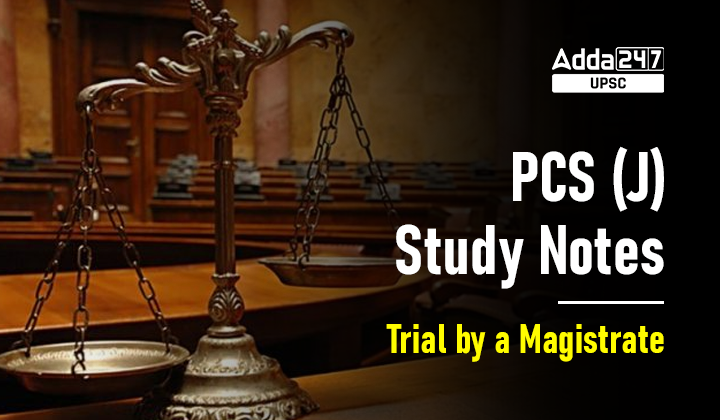Table of Contents
Trial by a Magistrate
In the criminal justice system, there are two distinct sorts of cases: summons cases and warrants cases. Warrant cases involve offences that carry a maximum sentence of two years in jail or more. The sentence in a warrant case is longer than in a summons case, but that’s the only real difference. Magistrate courts can hear trials involving warrants.
Magistrates hear warrant cases under sections 238–250 of the Criminal Procedure Code, 1973 (CrPC).
There are two distinct sorts of trials for warrant cases:
1.By a police report- Police reports are included in Section 173 of the Criminal Procedure Code and are defined as information provided by a police officer to a Magistrate. At the outset of the trial, the accused person is taken before a magistrate. According to section 173(2)(i), once the investigation is complete, the police station must send the case to the Magistrate with jurisdiction over the offence.
An FIR is filed at the police station to initiate a case like this, which is based on information from a police report. The Magistrate will then hear the case. The Magistrate shall satisfy himself that the requirements of Section 207 have been met whenever a case is initiated based on a police report and the accused is brought or appears voluntarily before the Magistrate. The stages involved in a trial for a case initiated on a warrant and supported by a police report are outlined in Sections 238 to 243 of the Criminal Procedure Code.
2. By other than a police report- In this scenario, the complaint must be submitted to the Magistrate. When a complaint is filed with a magistrate instead of a police report, the warrant proceeding can officially commence. The accused person is taken or made to appear before a magistrate. The Magistrate opens the case by holding an initial hearing and formally recording any evidence presented. If a warrant case is initiated without a police report and instead brought before a magistrate through the filing of a complaint, the process is outlined in sections 244, 245, 246 and 247 of the CrPC.
एक मजिस्ट्रेट द्वारा परीक्षण
आपराधिक न्याय प्रणाली में, दो अलग-अलग प्रकार के मामले होते हैं: समन मामले और वारंट मामले। वारंट मामलों में ऐसे अपराध शामिल हैं जिनमें अधिकतम दो साल की जेल या उससे अधिक की सजा हो सकती है। वारंट मामले में सजा समन मामले की तुलना में लंबी है, लेकिन यही एकमात्र वास्तविक अंतर है। मजिस्ट्रेट अदालतें वारंट से जुड़े मुकदमों की सुनवाई कर सकती हैं।
दंड प्रक्रिया संहिता, 1973 (सीआरपीसी) की धारा 238-250 के तहत मजिस्ट्रेट वारंट मामलों की सुनवाई करते हैं।
वारंट मामलों के लिए दो अलग-अलग प्रकार के परीक्षण हैं:
1. एक पुलिस रिपोर्ट द्वारा- पुलिस रिपोर्ट को आपराधिक प्रक्रिया संहिता की धारा 173 में शामिल किया जाता है और एक पुलिस अधिकारी द्वारा एक मजिस्ट्रेट को प्रदान की गई जानकारी के रूप में परिभाषित किया जाता है। मुकदमे की शुरुआत में, आरोपी व्यक्ति को मजिस्ट्रेट के सामने ले जाया जाता है। धारा 173(2)(i) के अनुसार, एक बार जांच पूरी हो जाने के बाद, पुलिस थाने को अपराध पर अधिकार क्षेत्र वाले मजिस्ट्रेट को मामला भेजना चाहिए।
इस तरह का मामला दर्ज करने के लिए थाने में प्राथमिकी दर्ज की जाती है, जो एक पुलिस रिपोर्ट से मिली जानकारी के आधार पर होती है। इसके बाद मजिस्ट्रेट मामले की सुनवाई करेंगे। मजिस्ट्रेट खुद को संतुष्ट करेगा कि जब भी पुलिस रिपोर्ट के आधार पर मामला शुरू किया जाता है और आरोपी को लाया जाता है या स्वेच्छा से मजिस्ट्रेट के सामने पेश होता है तो धारा 207 की आवश्यकताओं को पूरा किया गया है। एक वारंट पर शुरू किए गए और एक पुलिस रिपोर्ट द्वारा समर्थित एक मामले के परीक्षण में शामिल चरणों को आपराधिक प्रक्रिया संहिता की धारा 238 से 243 में उल्लिखित किया गया है।
2. पुलिस रिपोर्ट के अलावा- इस परिदृश्य में, शिकायत मजिस्ट्रेट को प्रस्तुत की जानी चाहिए। जब पुलिस रिपोर्ट के बजाय मजिस्ट्रेट के पास शिकायत दर्ज की जाती है, तो वारंट की कार्यवाही आधिकारिक रूप से शुरू हो सकती है। आरोपी व्यक्ति को मजिस्ट्रेट के सामने ले जाया जाता है या पेश किया जाता है। मजिस्ट्रेट प्रारंभिक सुनवाई करके और प्रस्तुत किए गए किसी भी सबूत को औपचारिक रूप से रिकॉर्ड करके मामले को खोलता है। यदि पुलिस रिपोर्ट के बिना वारंट मामला शुरू किया जाता है और इसके बजाय शिकायत दर्ज करके मजिस्ट्रेट के सामने लाया जाता है, तो प्रक्रिया सीआरपीसी की धारा 244, 245, 246 और 247 में उल्लिखित है।



 TSPSC Group 1 Question Paper 2024, Downl...
TSPSC Group 1 Question Paper 2024, Downl...
 TSPSC Group 1 Answer key 2024 Out, Downl...
TSPSC Group 1 Answer key 2024 Out, Downl...
 UPSC Prelims 2024 Question Paper, Downlo...
UPSC Prelims 2024 Question Paper, Downlo...






